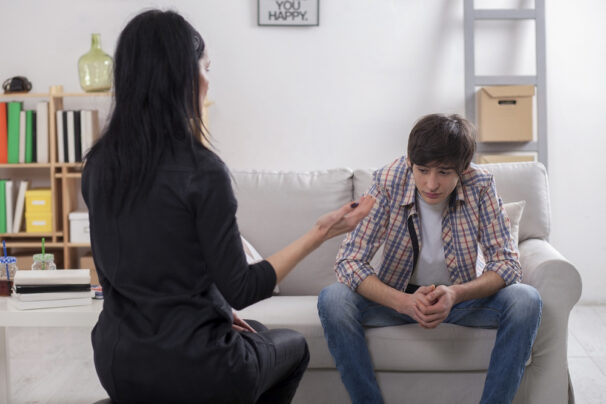Online therapy for childhood and teen depression
What is adolescent depression?
Adolescent depression is a mood disorder that affects children and teenagers, making them feel low and anxious.
Everyone can feel up and down, and going through these emotions is a normal part of growing up. Whilst having negative feelings can be an understandable response to something that has happened in someone’s life, when a young person is depressed, these low feelings can last longer.
However, depression is usually treatable. Medication, therapy, or a mixture of both can help treat childhood and teenage depression.
Types of depression in children and teens
There are many different types of adolescent depression, and there are other mental health conditions that can cause depression in children and teens. For example:
- Major depressive disorder: Also known as clinical depression, major depressive disorder is the most well-known type of depression in children and teens.
- Premenstrual dysphoric disorder (PMDD): PMDD can cause young people to feel symptoms of depression about a week before they start menstruating each month.
- Seasonal affective disorder (SAD): Individuals with SAD experience depression during specific seasons. People with SAD commonly experience depression symptoms in colder, darker months, but it can happen during any season.
- Disruptive mood dysregulation disorder: Children and teens with this disorder experience outbursts of anger and temper tantrums. This can develop into major depressive disorder.
- Dysthymia: Symptoms of dysthymia are milder than those of major depressive disorder, though they tend to last longer.
- Bipolar disorder: Bipolar disorder can cause mood swings and depressive symptoms.
When to seek treatment for childhood and teenage depression
What are the symptoms of adolescent depression?
If your child has adolescent depression, they may be persistently unhappy, feel hopeless, and lose interest in things they used to enjoy. Depression impacts how we feel, think and act.
Adolescent depression affects children and teens in different ways and can cause a wide variety of symptoms. Some common signs that your child or teenager is depressed can be (but not limited to):
- Feeling down, flat or sad
- Feeling numb or empty
- Becoming more irritable
- Avoiding friends, school or social situations
- Not wanting to do the things that you used to
- Feeling tired or low in energy
- Feeling hopeless and negative about themselves yourself, others, and the future
Sometimes, this depression can also lead to experiences of suicidal thoughts and wanting to self-harm. If your child or teenager expresses suicidal thoughts, it is important to seek emergency crisis support. You can call Samaritans on 116123, NHS 111, or 999.

At Onebright, we offer expert CBT for childhood depression that helps children understand how depression affects their thoughts, feelings, and behaviours. It also teaches them tools and strategies to help break patterns that may be keeping their depression going, helping them take back control.
We also offer other therapies that might be helpful, including Interpersonal Therapy (IPT). This is a type of psychotherapy that is based on the principle that relationships and life events can have an impact on mood and that the reverse is also true.
By working with a therapist, you and your child will learn to better understand the difficulties that they are experiencing and how to manage and work through them.
Working alongside your therapist, you and your child can learn the tools and approaches that work best to help you take back control and get back to a life that's worth living.
Everyone is different, and our expert team will work with you and your child to find the right treatment for adolescent depression.
Book online therapy for adolescent depression. At Onebright, we offer expert online therapy for children and teenagers experiencing depression.
Your child must be aged 5-17 years to access our therapy services.
Your child’s assessment will cost £100 (this includes consultation and report).
After your assessment, if your child is recommended for therapy, this will cost £125 per appointment.
(all fields marked * are mandatory)
Childhood and teen depression FAQs
- Being in a persistently sad or bad mood
- Being more self-critical
- Displaying a lack of energy or effort
- Struggling to enjoy things they typically would enjoy
- Showing changes to their sleeping and eating habits
- Experiencing unexplained aches and pains
- Becoming more withdrawn and avoiding social situations
If you believe your child is depressed, seeking treatment and therapy early can help them effectively manage their condition.
Individuals can apply what they learn in CBT to different aspects of their life, ultimately improving their mental health and quality of life.

